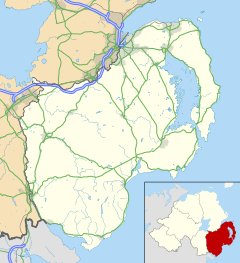Newcastle, Northern Ireland
| Newcastle | |
|---|---|
 View from main street in Newcastle towards Slieve Donard, the highest peak of the Mourne Mountains. |
|
| Newcastle shown within County Down | |
| Population | 7,444 |
| • Belfast | 32.5 miles (52.3 km) |
| District | |
| County | |
| Country | Northern Ireland |
| Sovereign state | United Kingdom |
| Post town | NEWCASTLE |
| Postcode district | BT33 |
| Dialling code | 028 |
| Police | Northern Ireland |
| Fire | Northern Ireland |
| Ambulance | Northern Ireland |
| EU Parliament | Northern Ireland |
| UK Parliament | |
| NI Assembly | |
Newcastle is a small town in County Down, Northern Ireland. It had a population of 7,444 in the 2001 Census. The seaside resort lies on the Irish Sea coast at the base of Slieve Donard, one of the Mourne Mountains, and is known for its sandy beach and the Royal County Down Golf Club. The town lies within the Down District Council area.
The town aims to promote itself as the "activity resort" for Northern Ireland and its most special attribute is its location at the foot of Slieve Donard. The town has benefited from a multi million upgrade which makes it a high quality seaside attraction. The town is twinned with New Ross, County Wexford, in the Republic of Ireland.
The name of the town is thought to derive from the castle built by Felix Magennis of the Magennis clan in 1588, which stood at the mouth of the Shimna River. This castle was demolished in 1830. The town is referred to as New Castle in the Annals of the Four Masters in 1433 so it is likely that he built on the site of an existing structure.
In the 17th century Ulster ports began to rise in prominence. In 1625 William Pitt was appointed as Customer of the ports of Newcastle, Dundrum, Killough, Portaferry, Donaghadee, Bangor and Holywood. The Montgomery Manuscripts record that Newcastle was besieged and later captured by Sir James Montgomery of the Ards in April 1642 in the aftermath of the 1641 Rebellion (pp. 128–134). Prior to 1641 the Castle belonged to the Magennis', but after the rebellion the property was confiscated and granted to Robert Hawkins, great grandfather to Robert Hawkins who assumed the surname of Magill. The date 1588 was inscribed on a stone placed over the front entrance of the Castle, built by Felix Magenis. Newcastle passed from the Magills to the Mathews, and subsequently to the Annesleys. In the late 1700s the Castle was modernised by the Matthews and then the Annesleys, and rented by the Board of Customs for the accommodation of revenue officers. Around 1830 the castle was demolished and the 'Annesley Arms Hotel' was constructed within the original castle compound. The 3rd Earl Annesley built a new 'marine residence', called 'Donard Lodge' on the lower mountain slope above the town (it was demolished in 1966). St. John's Church was also opened on 'The Rock' in 1832 to accommodate the visitors and growing population in Earl Annesley's developing seaside resort.
...
Wikipedia

